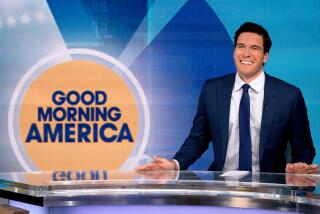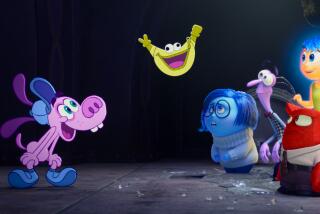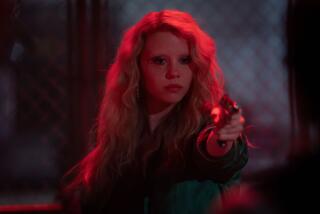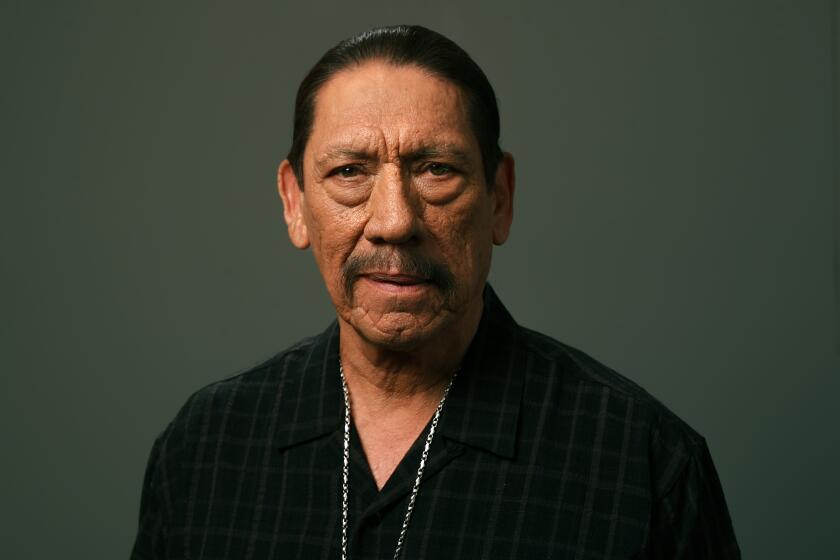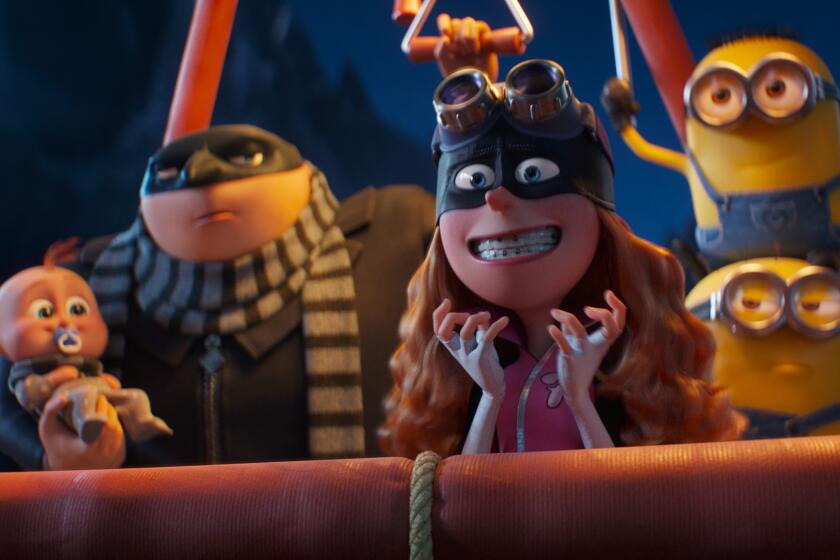‘Cadillac Man’ Finds a New Life : Movies: Robin Williams has a new picture and a new home, but his baby Zelda is sick and he’s just finished doing 60 television interviews.
Robin Williams has just finished 60 TV interviews in two days, hawking his latest movie, “Cadillac Man,” which opens May 18. He’s delighted the reporters, firing out hilarious sound bites with the speed of a submachine gun. The chameleon-like comic mimicked a Japanese rabbi, Jonathan Winters in a hot tub and Timothy Leary on acid for the hungry cameras.
The marathon finished, reporters and crews march off with their equipment and tape. Williams and his wife, Marsha Garces, escape up the elevator to his hotel suite.
Later, over lunch, Williams is subdued, worried. Nine-month-old Zelda, who is at the Williams’ home in San Francisco, has a temperature of 103. “She was making that Heimlich cry, staring at me like an Edvard Munch painting . . . I felt so helpless,” says a weary Williams, who had comforted his daughter all night. The phone rings and Williams tenses. Marsha gently reassures the overwrought father not to worry.
Asked about the grueling press junket, Williams scrunches his face, his beard flecked with gray trespassing on boyish freckles. “It’s like pimping a movie,” he says. “I’m playing the game, but, in the end, I wonder if promotion helps. If the movie isn’t good, overselling is like shooting bullets into a dead horse. I try to have a good time with the reporters and not have great expectations.”
In “Cadillac Man,” Williams plays a womanizing car salesman who fast-talks a crazed, jealous husband (Tim Robbins) with an AK-47 out of killing hostages. To prepare for his role, Williams visited some car dealerships in Queens but didn’t try selling. “Imagine a customer asking: ‘Watsa’ matter, Mork? Blew all your money? If you’d stayed with Mindy, you wouldn’t need to be doing this.’ ”
Abandoning his Caesar salad, Williams shifts four cerebral gears at once. He jumps from the table, acts out two Queens car dealers making a sales pitch to a Chinese customer. A reporter spills a glass of water while juggling two tape recorders trying to capture the barrage of words.
No wonder that three camera people, one with a portable Steadicam, followed the unpredictable actor around during the shooting of “Cadillac Man,” filming his antics as he’d explode into overdrive. Williams and co-star Tim Robbins (“Bull Durham”) usually did one scripted version before launching into improv. “It was like Abbott and Costello on speed,” recalls Williams. “Tim’s not afraid to fly or go off. We were really out there.”
Twice nominated for the Oscar for best actor (“Good Morning, Vietnam” and “Dead Poets Society”), Williams accepted the dark comedy role in “Cadillac Man” because it was an “interesting ensemble piece,” but the final film isn’t what he envisioned. “They (Orion Pictures) took some of of the edge away, which bothered me,” he says. “They tried it out on test audiences and decided to soften it up, changing the tone more towards comedy, but that’s the studio’s right. When it’s drama and comedy, they get confused on how to sell it and what audiences will respond to.” Should he have made it? “I don’t know.”
Williams was weaned on car-talk. His late father was a Lincoln Continental executive. “One day, when he came home in a station wagon, we knew he’d quit. It was a brutal, cut-throat business,” recalls the actor. The family’s move from Detroit to Marin County in 1969 was a watershed for the teen-ager.
Williams gladly shed the blazer and tie from his all-boys Detroit prep school, which resembled the one in “Dead Poets Society.” “Suddenly I was at a Gestalt High School, where students graduated if the energy was right . . . . I opened up, freed up . . . . It was a crazy time, and the Bay Area was like a human game reserve. Living here has made me what I am.”
Two months ago, Williams and his family moved into a house in San Francisco, overlooking the Golden Gate Bridge. “It’s large enough for all my things,” says Williams, whose toys include Napoleonic lead soldiers, five computers and hundreds of strategy and fantasy computer games. Inside the “War Room” at his 600-acre Napa Valley ranch are two more computers and boxes of computer programs.
Each morning, Williams, 38, jogs five miles and still makes unannounced midnight raids on local comedy clubs, especially the Holy City Zoo, where he bartended, performed and met his first wife.
“I went through my mid-life crisis in my 30s and now I’ve come to a wonderful point,” says Williams. “I no longer have that ‘get it now’ mentality. Now I can wait.”
He says he learned to wait only after leaving Los Angeles, where a stint at the Comedy Store led to a guest shot on “Happy Days,” and his own hitcom, “Mork and Mindy.”
In Los Angeles, says Williams, “I felt like a hemophiliac in a razor factory. I worried about my career every day. Where am I on the food chain? How am I doing? Oh, I’m failing. I don’t miss the show-off cars, portable phones in restaurants, the ‘fax me’ mentality.”
He recalls the L.A. cop who stopped him, saying, “Oh, Mr. Williams, before I give you a ticket, I’d like to show you my script.”
In his San Francisco neighborhood, Williams says he finds comfort. “People don’t leave scripts at my door. They treat me like a regular guy--yell at me to move my Range Rover. This place is home.”
But the actor concedes that he’s been away from home too long, working too hard on four movies back to back. “I need play time, especially with Zack (7) and Zelda.” That’s why, after his next film, “The King Fisher” with Jeff Bridges, Williams vows to “shut down” for six months to a year, that is unless “they bring me ‘Lech Walesa: The Musical.’ ”
He credits wife, Marsha, 32, with helping him learn to separate his life and career, “like church and state. Marsh makes me happy--she’s an amazing woman, a gentle, great soul, with a deep intelligence. Look how she’s helped my career. Now I have too much work and she’s helping me learn to say ‘No’--the most provocative word in Hollywood.”
Embarrassed by his praise, the soft-spoken brunette finishes lunch and rushes home to Zelda. “Marsh’s had to overcome a lot of unfair publicity,” says Williams sadly. He’s troubled by some articles painting her as a home-wrecker. When she was 21, she left Milwaukee to study Mandarin and art at San Francisco State University and worked as a waitress to earn money. Six years ago, William’s first wife, Valerie Velardi, hired her as Zack’s nanny.
“Marsh wasn’t in any way responsible for breaking up our marriage,” insists Williams. “She took care of Zack for a year when I was happily married to Valerie. Then she stopped working for us and my marriage fell apart. After Valerie and I had been apart for a year, Marsh started taking care of road stuff as my assistant. We became involved only after Valerie and I had split. When the bad publicity hit, I clammed up, afraid to cause waves for Zack’s sake. In retrospect, I should have spoken out.”
Williams says that his wife has played a “heavy-duty role in bailing me out. She’s helped me realize that fame can be like a drug, there’s an exhilaration to it, but you can come crashing down hard.”
Williams should know. He partied through the late ‘70s and ‘80s in an alcohol and cocaine haze. “There was a time I was on everything, but skates,” he recalls. “To remember those years, I’d need an amnesia hot line.” Then the death of pal John Belushi, testifying before a grand jury and approaching fatherhood knocked him straight. “I couldn’t imagine being fried and being a father.” Williams has gone through so much therapy, he says he deserves a discount.
Williams is one celebrity who quit narcotics without enrolling at the Betty Ford Clinic. “I couldn’t sit in a room with 40 other people and say, ‘I’ve been four days without a line.’ I decompressed and detoxed myself.” Once bloated like a blimp, Williams says he was helped by the discipline of being a college runner and wrestler and his mother’s Christian Science teachings that he could heal himself. And he did.
A lonely only child, Williams was raised by a housekeeper while his mother attended society events and father sold Lincolns. “I performed for my parents as a way of saying ‘Love me,’ ” he recalls. His father built him a huge sand table with thousands of toy soldiers. “Waging those full battles tested my imagination, taught me the power of fantasy.”
Williams uses comedy as a shield. “Comedy is a great way to keep people out,” he says. “It’s a weapon to hold people back, to defuse them. If they laugh, they won’t hurt you.”
You mean, at heart this comedian is shy? “Yes, very,” he admits. “I can barely talk to one person, but when I’m performing for 4,000 people, I’m on. The audience is my high. I could snort them.”
More to Read
Only good movies
Get the Indie Focus newsletter, Mark Olsen's weekly guide to the world of cinema.
You may occasionally receive promotional content from the Los Angeles Times.
